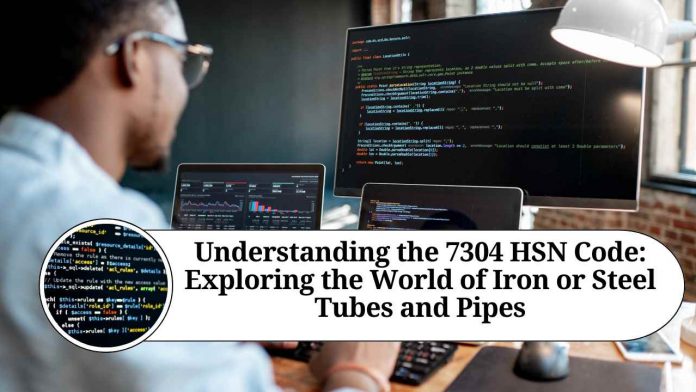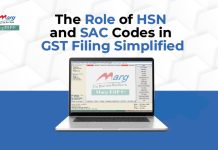Introduction
In the vast landscape of international trade and commerce, proper classification and coding of goods are crucial for efficient operations. One such classification code that plays a significant role in the import and export of iron or steel tubes and pipes is the 7304 HSN code. In this blog post, we will delve into the details of the 7304 HSN code, understand its significance, and explore the world of iron or steel tubes and pipes.
What is the 7304 HSN Code?
The Harmonized System of Nomenclature (HSN) code is a standardized system used to classify goods for international trade. The 7304 HSN code specifically refers to “Tubes, Pipes, and Hollow Profiles, Seamless, of Iron or Steel.” It is an important code for customs purposes, as it helps in the identification, valuation, and regulation of these specific goods.
Key Features and Categories:
The 7304 HSN code encompasses a wide range of products related to iron or steel tubes and pipes. Let’s explore some key features and categories within this code:
Seamless Tubes and Pipes:
The 7304 HSN code covers seamless tubes and pipes made of iron or steel. These products are manufactured using a process where a solid billet is pierced to form a hollow tube, ensuring a smooth internal surface. Seamless tubes and pipes find applications in various industries, including oil and gas, construction, automotive, and manufacturing.
Diameter and Thickness Variations:
Within the 7304 HSN code, you will find tubes and pipes with varying diameters and thicknesses. These dimensions are crucial, as they determine the suitability of the product for specific applications. From small-diameter tubes used in medical devices to large-diameter pipes used in infrastructure projects, the code covers a wide range of sizes to cater to diverse requirements.
Alloy and Non-alloy Steel:
Iron or steel tubes and pipes falling under the 7304 HSN code can be further classified into alloy and non-alloy steel. Alloy steel tubes contain additional elements like chromium, nickel, or molybdenum, enhancing their mechanical properties and resistance to corrosion. Non-alloy steel tubes, on the other hand, primarily consist of iron and carbon.
Significance and Global Trade:
The 7304 HSN code plays a vital role in facilitating international trade of iron or steel tubes and pipes. It allows customs authorities to accurately identify and categorize these goods, ensuring compliance with regulations and facilitating smooth import and export processes. The code also assists in determining the appropriate customs duties, tariffs, and other trade-related measures.
Moreover, the global demand for iron or steel tubes and pipes continues to grow, driven by infrastructure development, industrial expansion, and technological advancements. The 7304 HSN code provides a standardized framework for tracking trade volumes, analyzing market trends, and formulating trade policies related to these products.
Conclusion
Understanding the 7304 HSN code is essential for businesses engaged in the import and export of iron or steel tubes and pipes. By correctly classifying and utilizing this code, companies can navigate the complex world of international trade more efficiently. Whether it’s seamless tubes for the oil and gas industry or large-diameter pipes for infrastructure projects, the 7304 HSN code serves as a vital tool in regulating and facilitating the global flow of these essential products.
Read more useful content:
Frequently Asked Questions (FAQs)
Q. What does the 7304 HSN code represent?
The 7304 HSN code represents “Tubes, Pipes, and Hollow Profiles, Seamless, of Iron or Steel” in the Harmonized System of Nomenclature (HSN). It is used to classify these specific goods for international trade purposes.
Q. What products are covered under the 7304 HSN code?
The 7304 HSN code covers seamless tubes and pipes made of iron or steel. It includes products of various diameters and thicknesses, both alloy and non-alloy, used in industries such as oil and gas, construction, automotive, and manufacturing.
Q. How is the 7304 HSN code helpful in international trade?
The 7304 HSN code facilitates smooth import and export processes by accurately identifying and categorizing iron or steel tubes and pipes. It ensures compliance with customs regulations and helps determine appropriate customs duties, tariffs, and trade-related measures.
Q. Are there any specific size or dimension requirements for products under the 7304 HSN code?
Yes, the 7304 HSN code covers a wide range of sizes and dimensions for tubes and pipes. These variations accommodate different industry requirements, from small-diameter tubes used in medical devices to large-diameter pipes used in infrastructure projects.
Q. What is the difference between alloy and non-alloy steel under the 7304 HSN code?
Alloy steel tubes and pipes, falling under the 7304 HSN code, contain additional elements like chromium, nickel, or molybdenum, which enhance their mechanical properties and corrosion resistance. Non-alloy steel tubes primarily consist of iron and carbon.
Q. How can businesses determine the correct HSN code for their iron or steel tubes and pipes?
Businesses can consult the HSN code list provided by customs authorities or seek assistance from trade consultants or experts who have expertise in customs regulations. It’s important to accurately classify goods to ensure compliance and avoid any potential issues during customs clearance.
Q. Can the 7304 HSN code be subject to changes or updates?
Yes, HSN codes are periodically updated to reflect changes in trade practices and technological advancements. It’s crucial for businesses to stay updated with the latest code versions and any revisions made by the respective customs authorities.
Q. Are there any additional requirements or regulations related to the import or export of products under the 7304 HSN code?
Import and export regulations may vary depending on the country or region. It’s advisable for businesses to research and understand the specific requirements, including documentation, licenses, certifications, and any applicable quality standards, related to the import or export of iron or steel tubes and pipes.
Q. Are there any trade agreements or preferential tariffs associated with the 7304 HSN code?
Depending on the country or trade agreements in place, there may be preferential tariffs or trade benefits available for specific products under the 7304 HSN code. Businesses should explore and leverage such agreements to optimize their international trade operations.




















